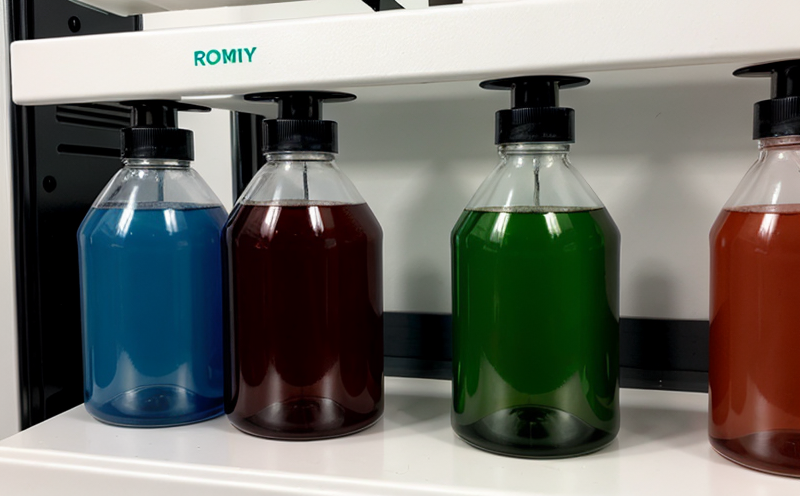ASTM D790 Flexural Reactivity Testing of Plastics
The ASTM D790 flexural reactivity testing is a critical method used in polymer science and materials engineering to measure the stress cracking resistance of plastic specimens. This test assesses how well a material resists cracking under mechanical loading, which is essential for ensuring that plastics meet durability standards and perform reliably across various applications.
The process involves subjecting a small notched specimen of thermoplastic or thermosetting polymer to defined flexural stress in a controlled environment. The goal is to determine the maximum load at which the material begins to crack, known as the "notch sensitivity" indicator. This test is particularly relevant for products that experience bending stress over time, such as automotive parts, electrical insulation, and household appliances.
Not only does ASTM D790 help manufacturers ensure product quality, but it also aids in optimizing polymer formulations by identifying weaknesses in material design or processing methods. By conducting this test early in the development cycle, engineers can pinpoint potential issues before costly production runs or market introductions.
The testing procedure adheres to strict standards set forth by ASTM D790, which specifies detailed guidelines for specimen preparation, environmental conditions, and loading protocols. Compliance with these specifications ensures consistent results across different laboratories, enhancing the reliability of test outcomes.
In addition to its role in quality control, ASTM D790 plays a significant part in regulatory compliance. Many industries rely on this standard as part of their product certification processes. By demonstrating adherence to ASTM D790 requirements, manufacturers can ensure they meet the safety and performance expectations set by governing bodies.
Understanding the intricacies of ASTM D790 is crucial for those involved in polymer research and development. It helps them make informed decisions regarding material selection and process optimization. For instance, understanding how varying factors like temperature, humidity, or specimen geometry influence test results allows researchers to fine-tune their approaches.
Moreover, the insights gained from ASTM D790 testing can be invaluable in addressing specific industry challenges. In sectors like aerospace, where lightweight materials are paramount yet durability is non-negotiable, this test becomes even more pivotal for selecting suitable polymers.
Scope and Methodology
| Aspect | Description |
|---|---|
| Specimen Preparation | The test specimen should be prepared according to ASTM D790, typically cutting a notched bar from the material under evaluation. Dimensions of the sample are specified in the standard. |
| Loading Conditions | A bending stress is applied using a four-point bend setup. The load is gradually increased until cracking occurs or fails to do so within certain criteria. |
| Environmental Control | The test must be conducted in controlled temperature and humidity conditions as specified by the standard, often at 23°C ± 1°C and relative humidity of 50% ± 2%. |
| Data Collection | Crack initiation is recorded visually. The maximum load before failure is measured accurately to report results. |
| Repeatability | The test should be repeatable with consistent results, ensuring the reliability of the findings. |
This method ensures that the results are accurate and can be relied upon for making informed decisions about polymer performance. The controlled environment and standardized procedure minimize variability, providing a robust basis for comparison between different materials or formulations.
Eurolab Advantages
At Eurolab, we pride ourselves on offering comprehensive testing services that go beyond mere compliance. Our expertise in ASTM D790 flexural reactivity testing sets us apart by providing detailed insights into the performance characteristics of your materials.
We employ state-of-the-art equipment calibrated to meet international standards, ensuring precise measurements and accurate results every time. Our highly skilled technicians are trained specifically in this area, allowing them to offer expert guidance throughout the testing process—from initial consultation to final report delivery.
Our commitment extends beyond just conducting tests; we also provide valuable feedback based on our findings. This helps you optimize your processes or refine your product design for improved performance and durability.
Moreover, Eurolab’s flexibility allows us to accommodate diverse testing needs, whether it's a one-off test or an ongoing quality assurance program. With multiple locations across Europe, we can provide localized support tailored to your specific requirements.
Environmental and Sustainability Contributions
The ASTM D790 flexural reactivity testing plays a crucial role in promoting sustainable practices within the plastics industry by ensuring that materials are both durable and environmentally friendly. By identifying weak points early on, manufacturers can reduce waste associated with substandard products reaching consumers.
Furthermore, understanding how various environmental factors affect polymer performance helps guide the development of more resilient materials capable of enduring harsh conditions without compromising safety or functionality. This knowledge contributes significantly to reducing lifecycle impacts while enhancing product longevity and reliability.
Through rigorous testing like ASTM D790, industries can minimize resource consumption by producing high-quality products that last longer, thus decreasing demand for replacement goods. Such efforts not only benefit the environment but also contribute positively towards corporate social responsibility initiatives.





